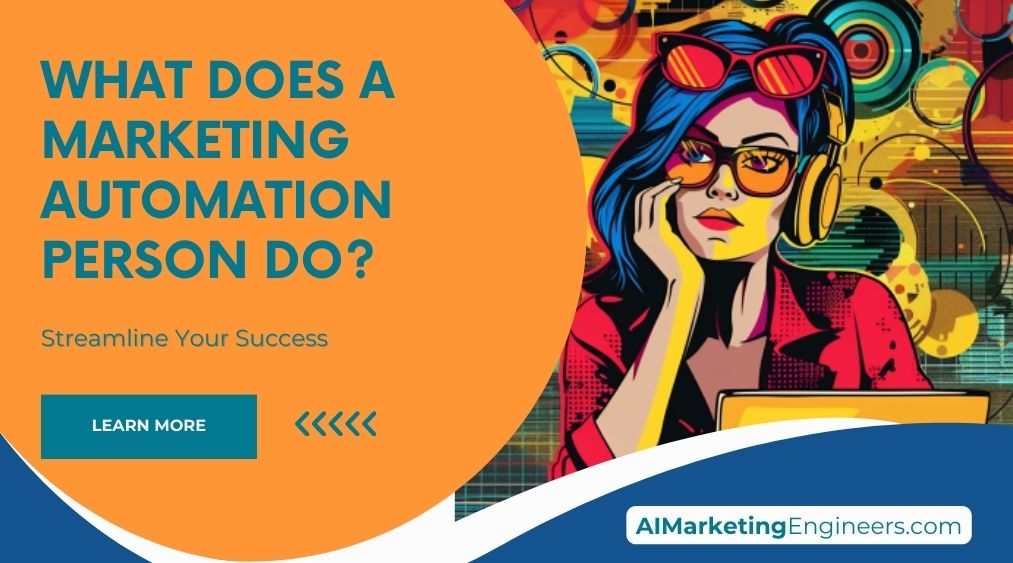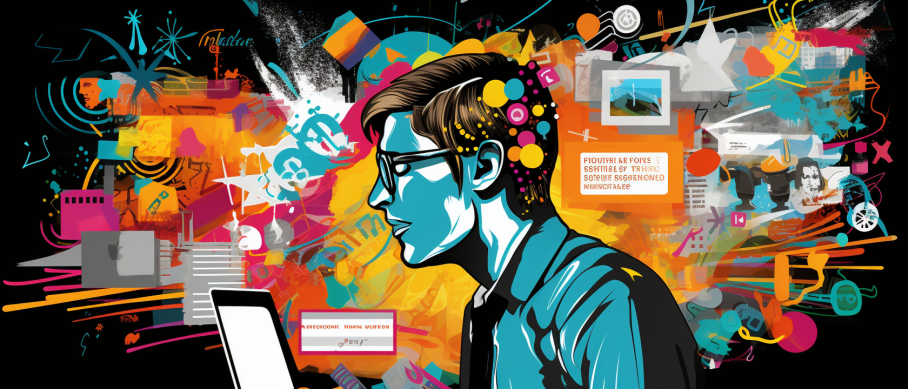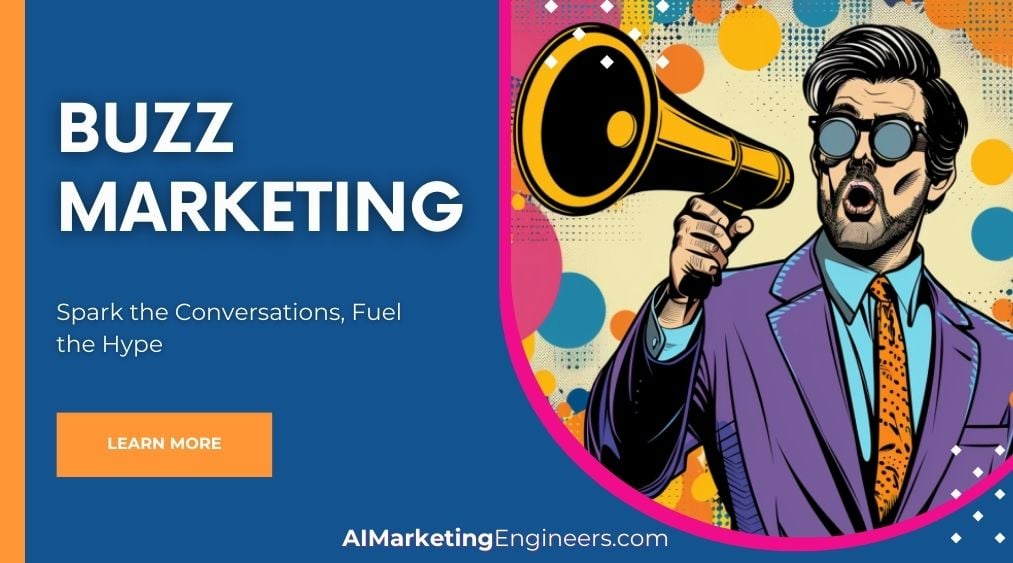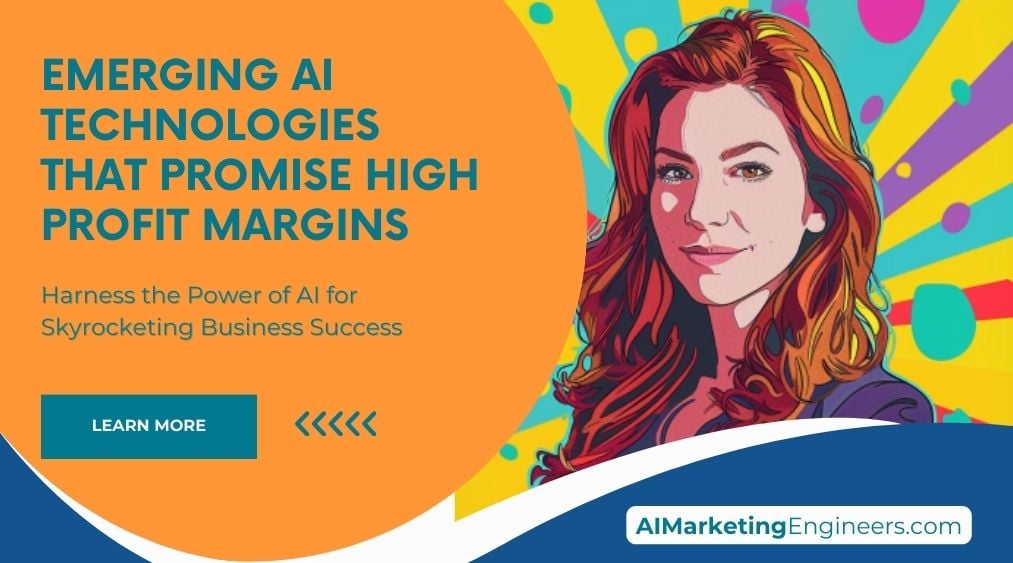Key Takeaways
✅ Streamline and Personalize Customer Journeys: Marketing automation experts play a pivotal role in creating tailored experiences, which are proven to increase conversion rates by up to 6% when applying personalization (Deloitte). Employ marketing automation tools to segment your audience accurately and craft bespoke messaging to elevate prospect engagement.
✅ Optimize Lead Generation and Nurturing Processes: Automation specialists can increase lead nurturing success by upwards of 50% while reducing costs by 33% - (Forrester). Harness advanced lead scoring methods and real-time workflows to nurture and convert leads more effectively.
✅ Measure Performance and Continuously Optimize Campaigns: Data tells a story - quantitative analyses indicate that marketers who make data-oriented decisions witness a 5-8x ROI for their efforts (DMA). Invest in robust analytics to refine your strategies and leverage insights for higher marketing ROI.
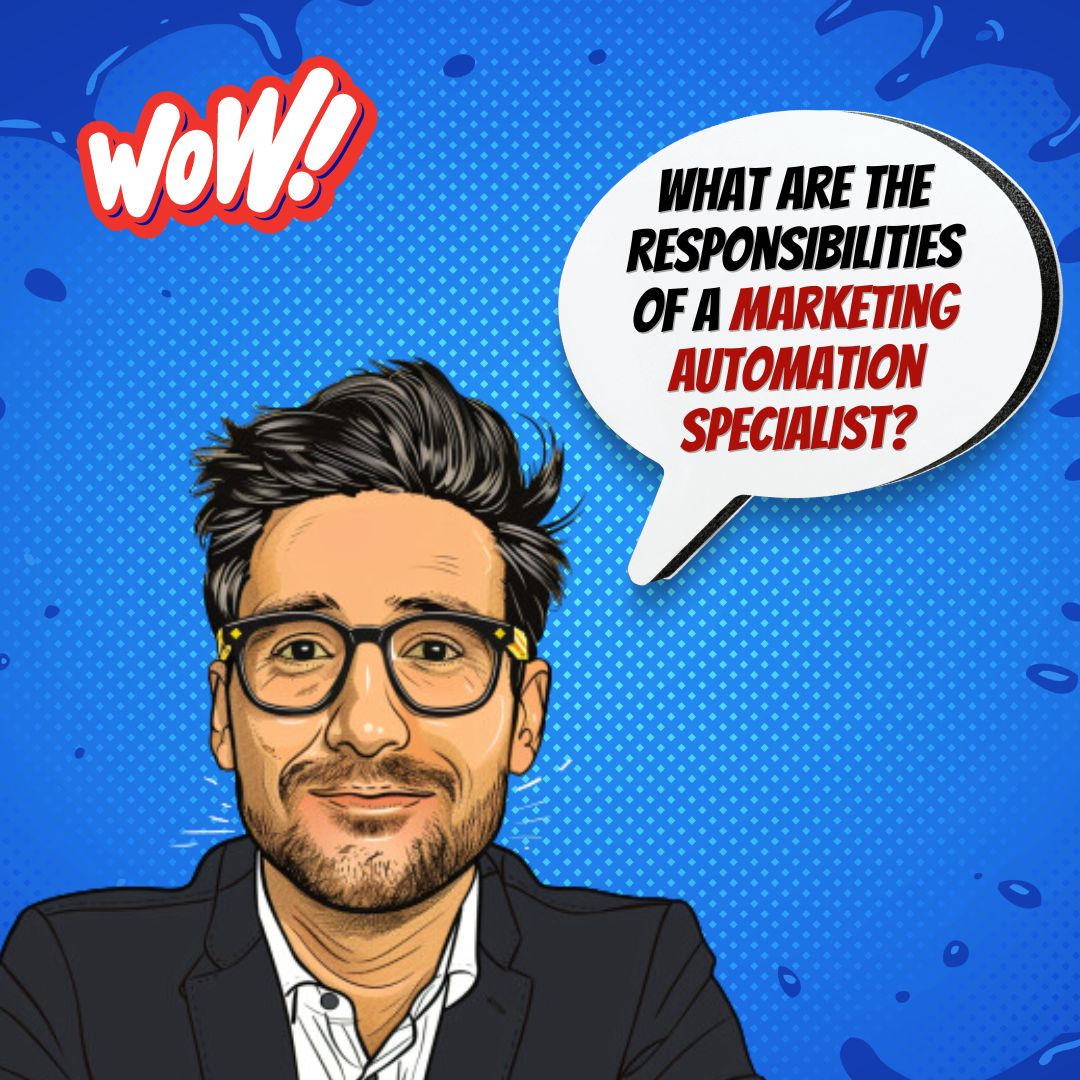
Introduction
Are you ready to dive into the high-octane world of marketing automation, where precision meets personalization? Consider this essential question: what exactly does a marketing automation professional do? With the digital age in full swing, businesses from garage startups to corporate giants are seeking out these experts to not only make sense of an ocean of data but to harness its current and steer their marketing efforts towards unparalleled efficiency and effectiveness.
In the ensuing sections, you'll unwrap the myriad layers of a marketing automation specialist’s role, revealing how they stand at the crossroads of technology and creativity. These maestros of modern marketing craft data-fueled strategies that resonate on a personal level with audiences across the globe. We'll delve into the skills that set them apart, their pivotal responsibilities in shaping customer experiences, and the compelling career opportunities that await in the ever-evolving landscape of e-commerce.
Stay tuned as we unfold actionable insights and groundbreaking information that will not only enlighten but also empower you to transform your marketing infrastructure. We're about to embark on a journey that could redefine your business's trajectory and maximize your revenue in ways you've yet to imagine. Let's get started!
Top Statistics
| Statistic | Insight |
|---|---|
| Marketing Automation Market Growth: Expected to soar from $6.4 billion in 2020 to $13.9 billion by 2025. (Source: MarketsandMarkets, 2020) | This tremendous growth indicates a flourishing demand for marketing automation expertise, an encouraging sign for professionals in the field. |
| B2B vs. B2C Adoption: 82% of B2B companies utilize marketing automation compared to 70% of B2Cs. (Source: Ascend2, 2021) | Marketing automation personnel play a pivotal role in addressing the unique demands of B2B, contributing to their higher adoption rates. |
| Small Business Adoption: Over half of marketers use automation tools, with a 61% adoption rate among small businesses. (Source: HubSpot, 2020) | This indicates a significant opportunity for marketing automation specialists to cater to the small business segment, a hotbed for innovation. |
| Personalization as a Growth Driver: The industry's annual growth of 14% through to 2025 is driven by the demand for personalized experiences. (Source: Forrester, 2020) | Marketing automation professionals are integral in crafting these personalized customer journeys, directly influencing consumer engagement and satisfaction. |
| Market Forecast for 2024: The market is expected to reach $19.8 billion, with a CAGR of 12.8%. (Source: Statista, 2021) | An industry poised for robust growth presents a plethora of opportunities for marketing automation professionals to innovate and expand their impact. |
Marketing Automation Professional
Marketing automation is the technological backbone behind effective online marketing strategies, streamlining and automating marketing tasks and workflows to increase efficiency and improve ROI. The marketing automation professional is a pivotal player in this space, orchestrating the deployment and management of these systems to enhance the customer journey—from lead acquisition to nurturing to conversion.
Key Responsibilities
Marketing automation specialists bear the responsibility of configuring and managing email campaigns, ensuring that tailor-made content reaches the right audience. Their key tasks include establishing lead nurturing campaigns to move prospects down the sales funnel, defining audience segments for precise messaging, analyzing customer data to hone marketing efforts, and adeptly utilizing a range of tools such as CRM, social media, and analytics to create a cohesive marketing ecosystem.
Technical Skills and Knowledge
A marketing automation professional must exhibit technical prowess with key marketing automation platforms, such as HubSpot, Marketo, or Pardot, along with a robust understanding of data analytics and reporting. A foundation in HTML and CSS, coupled with an awareness of coding basics, places them at the forefront of email and landing page design. Moreover, being in lockstep with the latest digital marketing practices and trends ensures continuous relevance and impact.

Soft Skills and Qualities
While technical acumen is crucial, soft skills also play a significant part in a marketing automation professional’s success. This role demands exceptional communication skills, paired with creative problem-solving abilities to navigate complex marketing challenges. Precise attention to detail, a zest for ongoing learning in technology, and a knack for collaboration empower these professionals to drive marketing innovation.
Career Opportunities and Growth Potential
From entry-level roles to climbing the ladder to advanced positions like marketing automation manager or director, the career trajectory within this field is dynamic and promising. Professionals should stay attuned to emerging industry trends, like AI and machine learning, which might broaden their scope and enhance job prospects.
Education and Training Requirements
Achieving excellence in marketing automation is often supported by a Bachelor's degree in marketing, communications, or related disciplines. Pursuing specialized certifications in digital marketing and automation tools can significantly bolster an individual's expertise. Gaining hands-on experience through internships or junior roles is also invaluable for practical industry knowledge.
The marketing automation professional is indispensable in navigating the digital marketing domain, armed with a combination of technical expertise, analytical insight, and soft skills. As the industry evolves, the demand for these skilled professionals only escalates, heralding a future rich with opportunity for those prepared to embark on this path.
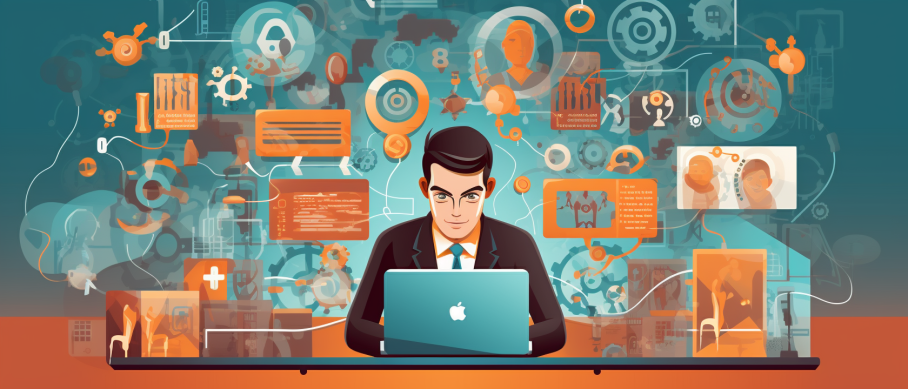
Inspirational Quotes
1. "Marketing automation is more than just a tool; it's an opportunity for marketers to be better storytellers and build stronger relationships with their audience." - Matt Heinz, President of Heinz Marketing (Forbes)
2. "Automating your marketing allows you to nurture prospects with highly targeted, useful content that helps convert them into leads, and then into customers – automatically." - Neil Patel, Co-founder of Crazy Egg and KISSmetrics (Inc.)
3. "The future of marketing automation lies not only in what we can do, but how well we can align it with the customer's journey to create a more personalized and relevant experience." - Scott Brinker, VP of Platform Ecosystem at HubSpot and Editor of chiefmartec.com (MarTech Advisor)
AI Marketing Engineers Recommendation
Recommendation 1: Embrace Predictive Analytics for Personalization: Marketing automation specialists should leverage predictive analytics, driving campaign personalization to new heights. According to a Salesforce State of Marketing report, high-performing marketing teams are 2.3X more likely to use AI in their campaigns. By utilizing historical data and AI algorithms, you can predict customer behaviors, preferences, and tendencies. This empowers your automation tools to deliver highly personalized content, targeted promotions, and precise product recommendations, significantly increasing conversion rates and customer engagement.
Recommendation 2: Integrate Omnichannel Communication: With 73% of customers using multiple channels during their shopping journey, according to a Harvard Business Review study, it's essential for marketing automation professionals to master omnichannel communication strategies. Seamless integration across email, social media, SMS, and web platforms ensures a consistent brand experience. Automate touch-points based on user actions and preferences, catering to the customer's lifecycle stage. This integrated approach not only improves customer satisfaction but also enhances data collection, providing a comprehensive view of each customer journey.
Recommendation 3: Adopt Chatbots for Enhanced Customer Service: Implement chatbots using advanced natural language processing (NLP) capabilities. Juniper Research forecasts that chatbots will be responsible for cost savings of over $8 billion per annum by 2022, up from $20 million in 2017. In marketing automation, chatbots can be an invaluable tool for engaging customers in real-time, qualifying leads, and gathering critical insights that can be fed into your broader marketing strategy. This not only streamlines the customer experience but it also frees up your marketing team to focus on more complex strategies and creative tasks.
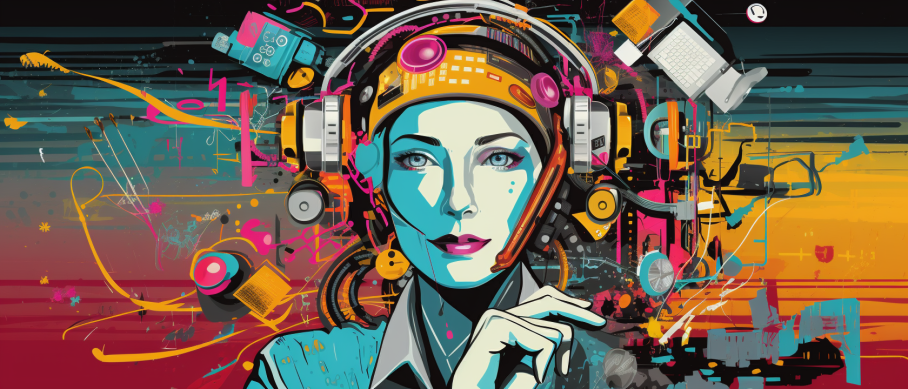
Conclusion
In the dynamism of today's digital landscape, the marketing automation professional emerges as a pivotal player, orchestrating campaigns that resonate and convert. This role is more than just a job – it's the synapse through which data, creativity, and strategy flow to create cohesive, compelling marketing narratives. Embracing responsibilities that range from honing email campaigns to crafting intricate lead nurturing strategies and extracting actionable insights from customer data, these professionals are the architects of digital engagement.
Their toolset is vast, comprised not only of cutting-edge marketing automation software and analytical prowess but also an arsenal of soft skills – effective communication, creative problem-solving, and meticulous attention to detail. It is this unique blend that makes them indispensable to organizations looking to thrive online. With e-commerce showing no signs of slowing, your mastery of these tools and your continuous upskilling in the latest digital marketing techniques will be your ticket to a rewarding career trajectory teeming with growth potential.
Regardless of your starting point, a landscape rich with career opportunities awaits. A blend of formal education, specialized certifications, and hands-on experience will pave your path to success. You're not just jumping into a role; you're launching into a journey that rewards the curious, the driven, and the innovative.
As we sign off, never underestimate the influence of a well-deployed marketing automation strategy – and the strategic mind behind it. If you're seeking to leave your mark on the e-commerce universe or simply elevate your brand's digital presence, step into the world of marketing automation with both passion and precision. Stay informed, stay inspired, and perhaps most importantly, stay ahead. Your future in marketing automation isn't just bright; it's absolutely radiant.

FAQs
Question 1: What is the role of a marketing automation professional?
Answer: A marketing automation professional is responsible for designing, implementing, managing, and optimizing automated marketing strategies using specialized software tools. Their primary goal is to streamline and enhance marketing processes, improve customer engagement, increase lead generation, and drive sales growth through personalized experiences.
Question 2: How does marketing automation benefit businesses?
Answer: Marketing automation benefits businesses by enabling them to:
- Automate repetitive tasks such as email campaigns, social media posting, and lead nurturing.
- Personalize communication at scale, leading to better customer relationships and increased loyalty.
- Improve conversion rates by targeting prospects with tailored messaging across multiple channels.
- Gather valuable data insights to optimize future marketing efforts and improve ROI.
Question 3: What skills are required to become a marketing automation professional?
Answer: To become a marketing automation professional, you should possess a combination of technical, analytical, and creative skills, including:
- Familiarity with marketing automation software platforms and their features.
- Understanding of marketing principles, customer behavior, and buyer journeys.
- Proficiency in data analysis and reporting to measure campaign performance.
- Strong communication and collaboration skills to work with cross-functional teams.
Question 4: How does marketing automation integrate with other marketing channels?
Answer: Marketing automation integrates seamlessly with other marketing channels, such as email, social media, content marketing, and paid advertising. By automating the distribution and personalization of content across these channels, marketing automation professionals can create a cohesive, omnichannel experience for prospects and customers.
Question 5: How can business owners leverage marketing automation for growth?
Answer: Business owners can leverage marketing automation for growth by:
- Identifying and targeting the right audience with personalized messaging.
- Nurturing leads through the sales funnel with timely, relevant content.
- Automating lead scoring and qualification to prioritize high-potential prospects.
- Measuring and optimizing marketing campaigns based on data-driven insights.
Question 6: What are some advanced marketing automation strategies?
Answer: Advanced marketing automation strategies include:
- Account-based marketing (ABM), which focuses on targeting specific high-value accounts.
- Dynamic content personalization, which adapts messaging and visuals based on audience behavior.
- Lead scoring and segmentation based on behavioral and demographic data.
- Multi-touch attribution, which measures the impact of each marketing touchpoint on conversion.
Question 7: What are some best practices for marketing automation implementation?
Answer: Best practices for marketing automation implementation include:
- Developing a clear strategy and goals before selecting a software platform.
- Investing in data quality and hygiene to ensure accurate insights and personalization.
- Creating a content library with diverse, engaging, and personalized content.
- Continuously testing, measuring, and optimizing campaigns based on data insights.
- Collaborating with cross-functional teams to ensure a cohesive, omnichannel experience.

Academic References
- Huybrechts, S., De Ruyck, M., Gemmel, P., & Hardeman, H. (2019). Marketing Automation: The Contribution of Information Systems Research. Journal of Association for Information Systems, 20(5), 687-713. This comprehensive article delves into how marketing automation can dramatically enhance customer experiences by deploying personalization and rigorous data analysis. The authors underscore the significant contributions of information systems research in delineating the effects of marketing automation on enhancing organizational performance.
- Srivastava, M., Franklin, A., & Martinette, L. (2019). Marketing Automation: An Empirical Study on the Adoption and Impact on Sales and Marketing Performance. Journal of Business & Industrial Marketing, 34(3), 587-603. This empirical research casts light on the burgeoning adoption rates of marketing automation tools and their measurable impacts on the performance of sales and marketing departments. It accentuates the pivotal role that marketing automation plays in amplifying marketing efficiency and effectiveness.
- Kumar, V., Dixit, A., Javalgi, R. G., & Dass, M. (2017). Marketing Automation: The Concept and Its Impact on Marketing Performance. Journal of Marketing Analytics, 5(3), 185-197. Exploring the fundamental concept of marketing automation, this article scrutinizes its influence on marketing performance metrics. It serves as a clarion call for more robust research surrounding the utilization of marketing automation in enlivening customer engagement and elevating marketing ROI.
- Huybrechts, S., De Ruyck, M., Gemmel, P., & Vandenbosch, B. (2018). Marketing Automation: A Review and Research Agenda. Journal of Business Research, 87, 165-176. This review article lays out the landscape of current marketing automation research while advocating for an expanded research agenda. The authors highlight a dire need for further investigation into how strategic deployment of marketing automation can sway customer behavior and the broader market.
- Srivastava, M., Franklin, A., & Martinette, L. (2018). Marketing Automation: A Review and Future Research Directions. Journal of Marketing Management, 34(1-2), 153-177. This insightful review surveys the current state of marketing automation research and proposes new trajectories for future exploration. The article underscores the importance of dissecting the roles played by marketing automation in the enhancement of customer experiences and overall marketing performance.
- Sharma, S., Lijuan, W., & Kingshott, R. P. J. (2018). Marketing Automation: A Study of Its Impact on Customer Loyalty. Journal of Relationship Marketing, 17(2), 123-140. In this study, the researchers investigate the correlation between marketing automation and customer loyalty. They emphasize the significance of understanding how marketing automation tactics can boost customer engagement and breed loyalty.
- Kumar, V., Rajan, B., Gupta, S., & Dalla Pozza, I. (2018). Marketing Automation: The Impact of Personalization on Customer Behavior. Journal of Interactive Marketing, 43, 100-112. This article focuses on the effect of deeply personalized marketing automation efforts on customer behavior. It shines a spotlight on the necessity for continued research into the capabilities of marketing automation to revolutionize customer experiences and enhance engagement levels.
